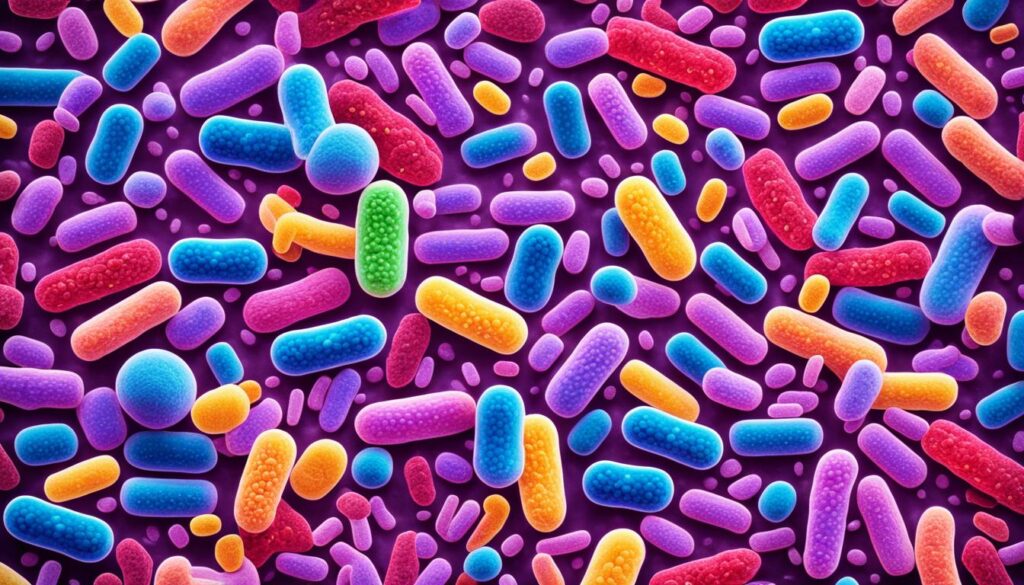Your overall health is closely tied to how well your digestive system works. A balanced digestive function ensures proper nutrient absorption, supports gut health, and enhances overall wellness. By focusing on natural ways to enhance digestion, you can maintain a strong immune system, steady energy levels, and a positive mood. This article explores effective digestive support solutions to help you achieve optimal health.
But, many people struggle with digestive problems in today’s fast world. These issues can lead to bloating, gas, and even serious conditions like irritable bowel syndrome (IBS) and inflammatory bowel disease (IBD). Keeping your gut healthy is key to avoiding these problems.
Your digestive system is always working hard. It makes energy for your cells and gets rid of waste. If it’s not healthy, it can affect every part of your life.
Transform Your Digestion Today. Discover the secret to a happier, healthier gut.
Key Takeaways
- Digestive disorders have risen dramatically due to factors like high stress, sedentary lifestyles, and poor sleep.
- Poor digestion can lead to issues such as constipation, heartburn, bloating, gas, and nutritional deficiencies.
- Chewing food thoroughly, engaging in regular exercise, and consuming whole, nutrient-dense foods can optimize digestion.
- Gut health is crucial for overall well-being, as the digestive system impacts energy, mood, and immune function.
- Natural remedies like probiotics, digestive enzymes, and lifestyle changes can help improve gut health and digestion.
Understanding Your Digestive System
Digestion starts long before we eat our first bite. It’s a complex process involving many organs and tissues. These work hard to break down food, get nutrients, and get rid of waste. Knowing how digestion works helps us keep our health in check.
The Importance of Proper Digestion
Good digestion is key for staying healthy. Your digestive system takes the food you eat and gets out the important nutrients. These nutrients then go into your bloodstream to give you energy, help you grow, and heal.
How Long Does It Take to Digest Food?
How fast your body digests food changes based on many things. These include the food type, how hydrated you are, how active you are, stress levels, and your health. On average, it takes about 24 hours for the body to finish digesting food and have a bowel movement. But, this can vary from one person to another.
The time for digestion also depends on the meal’s makeup. Foods high in fiber and protein take longer to digest than simple carbs. Stress, not moving enough, and health issues can also slow down digestion and cause problems.
Learning about your digestive system and what affects digestion can help you make better choices. This supports your gut health and overall well-being.
Signs of Slow Digestion
Knowing the signs of slow digestion is key to better gut health. Look out for these symptoms if your digestion is off:
- Frequent constipation or irregular bowel movements
- Bloating, gas, and abdominal discomfort after meals
- Heartburn, acid reflux, or feeling uncomfortably full
- Unintentional weight gain or trouble losing weight
Being aware of these signs of poor digestion and symptoms of sluggish digestion is crucial. They can really affect your health and happiness. By finding and fixing the causes, you can help your digestive system. This leads to better health overall.
| Symptom | Potential Cause | Impact |
|---|---|---|
| Constipation | Lack of fiber, dehydration, sedentary lifestyle | Difficulty passing stool, abdominal discomfort, potential toxin buildup |
| Bloating and Gas | Consuming gas-producing foods, food intolerances, bacterial overgrowth | Abdominal pain, discomfort, and embarrassment |
| Heartburn | Consuming spicy, fatty, or acidic foods, stress, obesity, pregnancy | Chest pain, difficulty swallowing, potential damage to the esophagus |
| Unintentional Weight Gain | Slow metabolism, nutrient malabsorption, gut dysbiosis | Increased risk of chronic health issues, decreased quality of life |
Understanding these common signs of poor digestion and symptoms of sluggish digestion helps you support your gut health. This can lead to better overall well-being.
Revolutionize Your Digestive Health
Take the first step towards natural digestive wellness.
Causes of Sluggish Digestion
Sluggish digestion can be frustrating and affect your overall well-being. Several factors can make digestion slower than usual. These include not getting enough fiber, eating too many processed foods and sugar, and having undiagnosed health issues.
Lack of Fiber
Dietary fiber is key for regular bowel movements and a healthy gut. Not getting enough fiber can cause constipation, slowing down digestion. Eating foods high in fiber like fruits, vegetables, whole grains, and legumes can help.
Processed Foods and Sugar
Highly processed foods and added sugars can harm your digestive system. These foods are often low in fiber and nutrients but high in additives that can upset your gut. Cutting down on these foods can make digestion faster and more efficient.
Undiagnosed Conditions
Some health issues like food allergies, lactose intolerance, or irritable bowel syndrome (IBS) can slow down digestion. If you keep having digestive problems, seeing a healthcare professional is a good idea. They can find and treat any health issues that might be slowing down your digestion.
| Reasons for Slow Digestion | Factors Affecting Digestion |
|---|---|
| Lack of Fiber | Food Consumed |
| Processed Foods and Sugar | Hydration Level |
| Undiagnosed Conditions | Physical Activity |
| Stress | |
| Overall Health |
To improve sluggish digestion, focus on the main causes. This can help your gut health and make bowel movements regular and efficient. Stay tuned for more tips on natural remedies and lifestyle changes to support your digestive system.
Natural Remedies to Improve Digestion
Dealing with digestive issues can be tough, but there are easy ways to help your digestion without medicines. By changing a few habits, you can support your body’s natural digestion and get better gut health.
Regular Exercise
Regular exercise can really help your digestive system. It makes your digestive muscles work better, speeding up how fast food moves through your body. Try to do at least 30 minutes of moderate exercise, like walking, cycling, or swimming, most days.
Stay Hydrated
Drinking enough water is key for good digestion. It keeps your stool soft and easy to pass. Drink at least eight 8-ounce glasses of water each day, spread out over the day, not all at once.
Consume More Fiber
Fiber is important for your digestive health. It makes your stool bulkier, helping your bowels move food better. Women should aim for 25 grams of fiber a day, and men should aim for 38 grams. Good fiber sources are avocados, raspberries, artichokes, lentils, oats, and chia seeds.
Adding these natural remedies to your life can help your digestion and improve your gut health. Remember, good digestion is important for your overall health. Focus on these simple but effective ways to improve digestion naturally and find relief from digestive discomfort.
Boost Your Digestive Power
Unlock the benefits of balanced digestion now.
Dietary Changes for Better Gut Health
Keeping a gut-friendly diet is key for good digestion and gut health. It’s important to eat fewer processed and fried foods. These foods can really harm your digestive system.
Limit Processed and Fried Foods
Processed foods often have little water and fiber, which can cause constipation. They’re also high in sugar and salt, messing with your metabolism. For instance, sugary drinks like soda have a lot of fructose.
This simple sugar can fill up your intestines and mess with your fullness signals, making you eat too much.
Incorporate Healthy Fats
Also, try to add more healthy fats to your gut-friendly diet. Foods like nuts, seeds, avocados, and fatty fish are full of good fats. These foods help your digestive health a lot.
By eating these foods, you can help your gut microbiome thrive and improve your digestion. A gut-friendly diet full of fiber, healthy fats, and whole foods is the best way to get better gut health.
“Shifting from an animal-based diet to a plant-based diet, or vice versa, can alter the microbiome composition within as little as 24 hours according to a Nutrients review.”
natural digestion aid, improve gut health, digestive support solution
Keeping your gut healthy is more than just eating right. Natural supplements can give your digestive health an extra boost. Let’s look at how probiotics, prebiotics, and digestive enzymes help your gut work its best.
Probiotics and Prebiotics: The Gut’s Dynamic Duo
Probiotics are live microorganisms that work with your gut’s natural bacteria. They break down harmful gut plaque, helping to keep your microbiome balanced. Prebiotics feed these good probiotics, helping them grow and work better in your gut.
Adding probiotic supplements to your daily routine can help your gut health and digestion. Eat foods high in prebiotics like onions, garlic, and bananas to help your gut’s balance even more.
Digestive Enzymes and Supplements: Unlocking Nutrient Absorption
Digestive enzymes break down the food you eat, making sure your body gets the nutrients it needs. Supplements with enzymes like amylase, protease, and lipase help digest carbs, proteins, and fats fully.
Minerals like zinc also help with digestion and getting nutrients from food. Adding these supplements to your daily routine can make sure your body gets the most from your food.
While a good diet is key, natural digestive aids can give your gut an extra boost. Try probiotic supplements, prebiotics, and digestive enzymes to see what works best for you.

“Gut health is the foundation for overall wellness. Nourish your digestive system with the right supplements, and you’ll be well on your way to feeling your best.”
Lifestyle Habits for Optimal Digestion
Your lifestyle choices can greatly affect your digestive health. By making healthier choices, you can help your digestion and gut health. Let’s look at two important areas to focus on.
Quit Smoking and Limit Alcohol
Smoking can increase the risk of stomach ulcers and cancers in the gut. It also makes acid reflux and heartburn worse. Quitting smoking is a big win for your digestive health.
Drinking too much alcohol can mess with the balance of acids in your stomach. This can lead to ulcers, acid reflux, and inflammatory bowel diseases. It’s best to drink in moderation. Women should aim for one drink a day, and men should aim for two.
Your Journey to Optimal Digestion Begins Here
Experience the change with our proven digestive solution.
Practice Mindful Eating
How you eat can affect your digestion too. Eating mindfully can improve nutrient absorption and ease digestion. Take time to enjoy your food, eat slowly, and listen to your body’s hunger and fullness signals.
Avoid eating in front of the TV or while distracted. This can lead to eating too much and poor digestion. Instead, eat in a calm setting and focus on the taste, texture, and smell of your food.
By making these lifestyle changes for digestion and adding habits for better gut health, you can help your body digest better. This supports your overall health and well-being.
“Treating the body well is the best way to keep the mind healthy and happy.”
Stress Management for Digestive Wellness
Stress hormones can really affect your digestion. When you’re stressed, your body thinks it’s in a hurry and doesn’t focus on digestion. This can make your digestive system work poorly and lead to issues like constipation or indigestion.
To help your digestion, try these stress-reducing activities:
- Meditation: Meditation can help manage stress and ease IBS symptoms.
- Yoga: Yoga’s focus on breathwork and mindfulness can reduce stress and support digestion.
- Relaxation Techniques: Methods like acupuncture, music therapy, and deep breathing can also ease stress on your digestive system.
Adding stress management to your life can boost your digestive health and overall well-being. A healthy gut is key for both your body and mind. So, don’t forget the importance of managing stress for your digestive health.

Our digestive tracts host about 200 different types of bacteria, viruses, and fungi. A diverse gut microbiome may lower the risk of diabetes, inflammatory bowel disease, and psoriatic arthritis. Poor gut health can cause fatigue, upset stomach, skin issues, and autoimmune problems.
“Stress is linked to stomach ulcers, diarrhea, constipation, and IBS. Techniques like meditation, relaxation training, cognitive behavioral therapy, acupuncture, and yoga can improve digestive symptoms.”
Establishing a Regular Eating Schedule
Keeping a steady eating schedule is key for good digestion and gut health. Eating big meals or snacking too late can upset your stomach and mess with your sleep. To keep your body in sync, eat smaller meals often during the day and skip heavy foods before bed.
Listen to your body’s hunger and fullness signals and follow a set mealtime routine. This helps your digestive system get ready for food, making digestion more efficient. It also boosts gut health and overall health.
Embrace Better Digestion Naturally
Find out how you can support your digestive health effortlessly.
Benefits of a Regular Eating Schedule
- Supports the body’s natural circadian rhythm and digestive cycle
- Helps regulate hunger and fullness signals for better portion control
- Reduces the strain on the digestive system, preventing discomfort and bloating
- Promotes better sleep quality by avoiding heavy meals before bedtime
- Enhances nutrient absorption and utilization
Tips for Establishing a Consistent Eating Schedule
- Eat at the same time each day, even on weekends, to train your body’s internal clock
- Consume smaller, more frequent meals (every 3-4 hours) to prevent overeating
- Avoid snacking late at night, as this can disrupt sleep and digestion
- Stay hydrated throughout the day to support proper digestion
- Incorporate regular exercise to stimulate appetite and improve gut health
| Optimal Eating Schedule | Sample Meal Plan |
|---|---|
| Breakfast: 7-8 AM | Oatmeal with berries and nuts |
| Snack: 10-11 AM | Greek yogurt with granola |
| Lunch: 12-1 PM | Grilled chicken salad with mixed greens |
| Snack: 3-4 PM | Apple with almond butter |
| Dinner: 6-7 PM | Roasted salmon with sweet potatoes and broccoli |
By having a regular eating schedule for digestion and watching what you eat at certain times, you help your body digest food better. This supports your overall health and wellbeing.
“Consistency is key when it comes to supporting a healthy digestive system. By sticking to a regular eating schedule, you can help your body optimize its natural functions for better overall health.”
Conclusion
Keeping your digestive health in check is key to feeling good overall. Eating a diet full of fiber, drinking plenty of water, managing stress, and exercising regularly helps your digestive system work right. Adding probiotics, prebiotics, and supplements can also boost your gut health and help you absorb nutrients better.
The key takeaways for optimal digestion are simple. They tell you how crucial good digestion is, what signs show your digestion is slow, and how to fix it with natural ways. Everyone is different, so pay attention to how you feel. If you keep having bad digestion, talk to a doctor for help.
Using the summary of digestive health tips from this article can help you manage your digestive health. This leads to a better digestive system and overall health and happiness.
“Ready to experience a transformative change in your digestive health? Take the leap today and embrace a naturally enhanced digestion journey. Click here to start your path to optimal digestive wellness!”
FAQ
What are the signs and symptoms of a sluggish digestive system?
Signs of a slow digestive system include constipation and not going to the bathroom often. You might also have heartburn, feel bloated, gain weight, or feel full after eating.
What are some common causes of slow digestion?
Eating too little fiber and too much processed food can slow down digestion. Too much sugar and not knowing about food allergies can also cause it. Other factors include the food you eat, how much water you drink, how active you are, stress, and your overall health.
How can I naturally improve my digestion?
To boost your digestion naturally, try regular exercise and drinking plenty of water. Eating more fiber, cutting down on processed and fried foods, and using probiotics and digestive enzymes can also help.
How does stress affect my digestive health?
Stress can hurt your digestion by taking energy and blood away from your digestive system. This can make it weaker and more likely to have problems like constipation or indigestion. Using stress-reducing activities like meditation, yoga, and deep breathing can help your digestion.
How important is maintaining a regular eating schedule for digestive health?
Eating smaller meals often and avoiding big or rich foods before bed helps your digestive system work better. Sticking to a regular eating schedule can also help with digestion and sleep.
“Have more questions about enhancing your digestive health? Dive into our comprehensive FAQ section for all the answers you need. Discover how to take control of your digestion journey today!”
